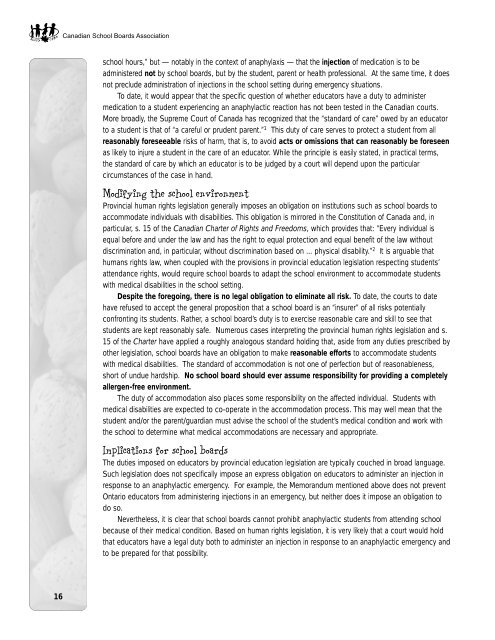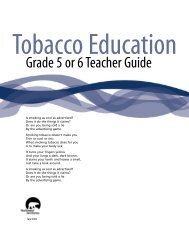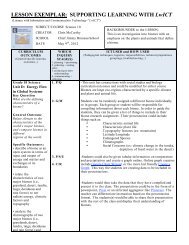Anaphylaxis: A Handbook for School Boards - Education, Culture ...
Anaphylaxis: A Handbook for School Boards - Education, Culture ...
Anaphylaxis: A Handbook for School Boards - Education, Culture ...
Create successful ePaper yourself
Turn your PDF publications into a flip-book with our unique Google optimized e-Paper software.
Canadian <strong>School</strong> <strong>Boards</strong> Associationschool hours,” but — notably in the context of anaphylaxis — that the injection of medication is to beadministered not by school boards, but by the student, parent or health professional. At the same time, it doesnot preclude administration of injections in the school setting during emergency situations.To date, it would appear that the specific question of whether educators have a duty to administermedication to a student experiencing an anaphylactic reaction has not been tested in the Canadian courts.More broadly, the Supreme Court of Canada has recognized that the “standard of care” owed by an educatorto a student is that of “a careful or prudent parent.” 1 This duty of care serves to protect a student from allreasonably <strong>for</strong>eseeable risks of harm, that is, to avoid acts or omissions that can reasonably be <strong>for</strong>eseenas likely to injure a student in the care of an educator. While the principle is easily stated, in practical terms,the standard of care by which an educator is to be judged by a court will depend upon the particularcircumstances of the case in hand.Modifying the school environmentProvincial human rights legislation generally imposes an obligation on institutions such as school boards toaccommodate individuals with disabilities. This obligation is mirrored in the Constitution of Canada and, inparticular, s. 15 of the Canadian Charter of Rights and Freedoms, which provides that: “Every individual isequal be<strong>for</strong>e and under the law and has the right to equal protection and equal benefit of the law withoutdiscrimination and, in particular, without discrimination based on ... physical disability.” 2 It is arguable thathumans rights law, when coupled with the provisions in provincial education legislation respecting students’attendance rights, would require school boards to adapt the school environment to accommodate studentswith medical disabilities in the school setting.Despite the <strong>for</strong>egoing, there is no legal obligation to eliminate all risk. To date, the courts to datehave refused to accept the general proposition that a school board is an “insurer” of all risks potentiallyconfronting its students. Rather, a school board’s duty is to exercise reasonable care and skill to see thatstudents are kept reasonably safe. Numerous cases interpreting the provincial human rights legislation and s.15 of the Charter have applied a roughly analogous standard holding that, aside from any duties prescribed byother legislation, school boards have an obligation to make reasonable ef<strong>for</strong>ts to accommodate studentswith medical disabilities. The standard of accommodation is not one of perfection but of reasonableness,short of undue hardship. No school board should ever assume responsibility <strong>for</strong> providing a completelyallergen-free environment.The duty of accommodation also places some responsibility on the affected individual. Students withmedical disabilities are expected to co-operate in the accommodation process. This may well mean that thestudent and/or the parent/guardian must advise the school of the student’s medical condition and work withthe school to determine what medical accommodations are necessary and appropriate.Implications <strong>for</strong> school boardsThe duties imposed on educators by provincial education legislation are typically couched in broad language.Such legislation does not specifically impose an express obligation on educators to administer an injection inresponse to an anaphylactic emergency. For example, the Memorandum mentioned above does not preventOntario educators from administering injections in an emergency, but neither does it impose an obligation todo so.Nevertheless, it is clear that school boards cannot prohibit anaphylactic students from attending schoolbecause of their medical condition. Based on human rights legislation, it is very likely that a court would holdthat educators have a legal duty both to administer an injection in response to an anaphylactic emergency andto be prepared <strong>for</strong> that possibility.16
















